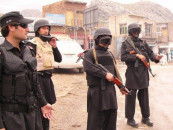Book launching: Muslim narcissism feeding terrorism
The narcissism of the Muslim civilization is the central theme of Dr Mubarak Haider’s book Tehzibi Nargisyat.

Book launching: Muslim narcissism feeding terrorism
The author said that the Muslim people have generally been hesitant in self criticism and have not subjected the history of their civilization to critical observation and a sickening self love and self aggrandizement have been their driving passion which is behind the tendency to look down upon all cultures and civilizations which
they aim ultimately at destroying in order to establish the supremacy of the Islamic way of life.
He said the desire to achieve dominance for their faith over the world was behind the present extremist movements and terrorism which the general lot of the Muslim people led by religious parties and groups was not ready to reject wholeheartedly.
As a result other civilizations and cultures were feeling threatened by what they call the ‘Muslim menace’. This has isolated the Muslim community in alien societies.
Unless the Muslim people adopted an accommodative attitude towards other cultures and eschewed their dream of imposing their way of life on others from their psyche, it would not be possible for them to make any progress or live in peace in the present day world which was very different from the old world in which they had achieved political and cultural dominance.
His ideas generated a lively debate among the audience.
Dr Aslam Syed who is here on a visit from Germany contested Dr Mubarak’s contention about the Muslim people’s narcissism and said that all civilizations have had this tendency at one time or the other. Moreover the Muslims have been quite objective in the assessment of their civilization and mentioned the work of Muslim scholar Shehrstani and other thinkers like Abu Bakr Razi who had subjected Muslim history to deep analysis and critical review.
Participants who joined the discussion were Kishwar Naheed, Dr Ayesha Siddiqa, Iqbal Jafar, Hameed Alvi, among others in the audience.
Published in The Express Tribune, December 21st, 2010.



















COMMENTS
Comments are moderated and generally will be posted if they are on-topic and not abusive.
For more information, please see our Comments FAQ